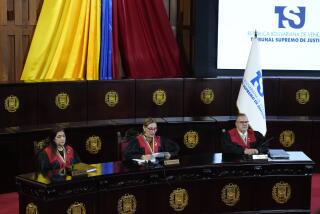Egypt opposition accuses Islamists of fraud in referendum
- Share via
CAIRO — Egypt’s opposition on Sunday charged that fraud was committed during a referendum on the nation’s Islamist-backed constitution, which preliminary results indicated had been approved by voters. The dispute augured more ill will and public confrontation between Muslim Brotherhood supporters and their opponents.
The constitution, which went before voters Saturday in a second and final round of balloting, was approved by 64%, according to an initial count, the state news agency reported.
Leaders from the National Salvation Front, or NSF, the coalition of leading nationalist, left-wing and moderate politicians, accused Islamists of systematic fraud and urged the government to not put the constitution into effect until an investigation could be carried out.
“We documented a set of irregularities that are clearly evidence of systemic violations,” said Amr Hamzawy, an NSF leader and political science professor. “We would like the responsible party to investigate and report the conclusions before the final results of the referendum are announced,” he added, referring to Egypt’s High Elections Commission.
The NSF said it had compiled a list of 1,500 violations in the referendum’s first round on Dec. 15 and said a similar number of abuses occurred Saturday. Charges include voters being turned away and judges who served as observers turning up late at voting centers where the constitution was expected to fail.
NSF leaders warned that the constitution amounted to President Mohamed Morsi’s first step in a plan to build an Islamist dictatorship. “We see that our people are on the verge of a series of laws that will ravage general freedoms and will humiliate the poor in this nation,” said Hamdeen Sabahi, one of the NSF’s leaders and a former presidential candidate.
Sabahi indicated that the coalition would continue to back demonstrations to pressure the government, calling the NSF’s supporters “a wide front for a great popular resistance in the street.” Since late November, those protests have turned into violent confrontations between Morsi’s supporters and the opposition.
Sabahi said the non-Islamist parties looked to elections as the place to defeat Morsi’s ambitions, but added that no final decision had been made on whether to compete in parliamentary elections coming early in the new year.
“We are ready to lead all democratic battles,” he said. “The Egyptian people will prove every time that they are able to democratically depose any group that imposes its authoritarianism.”
In turn, Islamist political figures sounded conciliatory notes Sunday but said nothing about addressing the allegations of fraud. Morsi’s office, sensitive to the accusations being railed against him, defended the draft constitution, calling it “a substantial improvement on human rights advocacy.”
Anticipating passage of the document, Morsi has started naming non-Islamist parties and Christians to the Shura, the parliament’s upper chamber. The body was elected in spring along with the lower house, which was later annulled by judges. The Shura remained intact, and will take on legislative powers now until the new lower assembly is elected.
Among the new 90 presidential appointments to the body were Christians and non-Islamist political parties. However, the Shura’s 270 seats remain dominated by Islamists, a fact that caused observers and critics to dismiss Morsi’s gestures as cosmetic.
Morsi’s supporters defend the president. They say his measures, including the emergency decree that allowed him to push through the constitution, were provoked by a hidden conspiracy to sabotage the Islamists now running the country after decades of suppression under deposed President Hosni Mubarak’s government and his predecessors.
The weeks of confrontation have clearly wearied Egyptians, already exhausted by two years of revolution and economic downturn. Only about 16 million of the nation’s 51 million voters cast ballots in the referendum, according to preliminary figures.
Despite the acrimony, Morsi and the Islamists are still in a better position than their opponents. They have relied upon decades of grassroots work by the Muslim Brotherhood, which supports the president, and have long been seen as a defender of ordinary Egyptians against a corrupt, uncaring state.
The NSF, dominated by personalities such as Amr Moussa, the former head of the Arab League, has yet to show it can similarly mobilize people en masse. The coalition’s groups, marred by infighting, have only in the last month been able to concentrate their energies, united by the battle over the constitution.
“The Islamists are able to guard their name because they are on the ground. They work with the people,” said analyst Hassan Abu Taleb of Al Ahram Center for Political and Strategic Studies. “This is what the opposition needs to change.”
Special correspondent Abdellatif reported from Cairo and Times staff writer Parker from Beirut.
More to Read
Sign up for Essential California
The most important California stories and recommendations in your inbox every morning.
You may occasionally receive promotional content from the Los Angeles Times.










